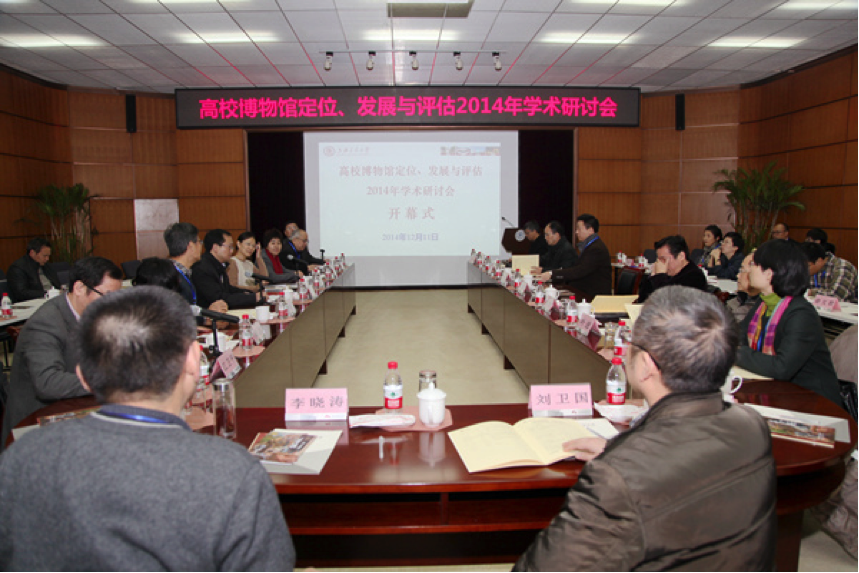University Museum Seminar
12/11/2014
Dec 11, 2014 marked the 3rd anniversary of the opening of Shanghai Jiao Tong University Qian Xuesen Library. In order to further enhance the professional level of university museums, serve university internal construction and give full play to the social education function of university museums, Qian Xuesen Library hosted the "2014 Seminar of the Positioning, Development and Assessment of University Museums"in the lecture hall. More than 30 leaders and experts attended the seminar, including Cao Rongrui, Deputy Secretary General of Shanghai Education and Public Health Party Committee, Shi Tong, Director of the Museum Management Department of Shanghai Cultural Relics Bureau, Cang Ping, Deputy Director of the Science and Technology Department of Shanghai Education Commission, Professor Song Xiangguang, Standing Director of China Museum Association, Director of University Museum Commission of China Museum Association and Professor of Peking University, Cui Bo, Associate Editor of China Cultural Relics News and Chief Editor of Museum Weekly, Qian Yonggang, Chief Librarian of Qian Xuesen Library, and other leaders and experts from major university museums of China. The opening ceremony of the seminar was presided by Zhang Kai, General Party Branch Secretary and Associate Librarian of Qian Xuesen Library.

Qian Yonggang said in his opening speech that university museums around the country had experienced a new upsurge of construction and development in recent years and had also obtained a lot of experiences in the course of development. He hoped that he could take this opportunity to exchange experiences with colleagues from other university museums and learn from each other, thus to create new understanding and make contribution to our university museum undertaking.
Cang Ping said that in order to give full play to the university museums’ function of social education and provide guidance for the internal construction and development of university museums, the Department of Science and Technology entrusted Qian Xuesen Library to set up the 2014 University Museum Assessment System of Shanghai, hoping to further encourage university museums to be opened to the public and expand their influence while serving the education and academic work of universities. Since it was the first university museum assessment work around the country, Cang Ping hoped that the participating experts could provide more precious opinions and suggestions.
Shi Tong provided several instructional suggestions concerning the general thinking of the “13th Five-year Plan” of Shanghai’s museums and the role that university museums play in the construction of public culture service.
Cao Rongrui delivered a speech at the end of the opening ceremony. He said that according to the general plan, Shanghai was pushing forward the comprehensive educational reform. One of the main focuses was to build and improve the all-round education community in and outside the university. University museums could play a greater role in this work. He hoped that Shanghai Education Commission could initiate the "Three-Year Plan for the Internal Construction of University Museums in Shanghai" and relevant assessment work, thus to accelerate the internal construction of university museums in Shanghai and enhance quality.
With the topic of "Three Questions for University Museums", Song Xiangguang, Associate Librarian of Peking University Sackler Archaeology and Arts Museum, discussed about the conceptual meaning, existence value and demand orientation of university museums; Lu Jiansong, Director of the Cultural Relics and Archaeology Department of Fudan University used vivid examples to introduced what made a good museum; Zhang Kai, General Party Branch Secretary and Associate Librarian of Qian Xuesen Library, shared practices and thoughts obtained in 2014 university museum assessment of Shanghai. Other participants also exchanged opinions concerning various topics, including the positioning, development and assessment of university museums, demonstration of the educational function of university museums, etc.
In the free speech section, participating experts and representatives discussed about the construction of university museum assessment system. Shi Jixiang, Deputy Director of Jilin University Museum and Director of Archaeology and Arts Museum, believed that the construction of university museum assessment system proposed by Shanghai Education Commission was a ground-breaking idea around the country which could play an instructional role in the development of university museums in China. He also pointed out that the assessment index and content still needed to be further detailed to be suitable for the characteristics of university. Lu Jiansong said that only by defining the assessment goal can we lead a reasonable development for museums. Song Xiangguang said that the university museum assessment system could play a guiding role to provide suggestions on what museums should do and how to do. This was the active side of this question. However, the characteristics of university should also be taken into consideration to conduct more scientific and systematic construction of the assessment index. Li Xiaotao, Deputy Director of Sichuan University Museum said that the educational function of museum should be further strengthened and we should also give full play to the educational function in the assessment system. Liu Weiguo, Deputy Director of South-Central University for Nationalities Ethnology Museum, pointed out that sustainability should be the most important question that university museums must consider for future development.
Representatives of many university museums attended this seminar, discussing and exploring future development of university museums. The participating universities included: Fudan University, Peking University, Central Academy of Fine Arts, Communication University of China, Harbin Engineering University, Sichuan University, China University of Geosciences (Wuhan), Shanghai University of Chinese Medicine, Jilin University, South-Central University for Nationalities, Northwest Agriculture&Forestry University, Northwest University, etc. During the seminar, participants also visited Qian Xuesen Library and the newly-built China Accounting Museum in Shanghai Lixin University of Commerce.
